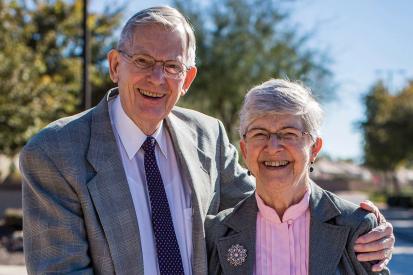Discriminatory Law Censored Pastor


As a pastor of a small church in Gilbert, Arizona, Clyde Reed simply wanted to let community members know where they could go to worship each Sunday. That’s why he wanted to put up a few signs around town before services to inform people where his Good News Community Church congregation would be meeting.
But Pastor Reed soon found out the Town of Gilbert had a sign code that restricted the type of signs he could put up and the timeframe in which he could advertise services. What’s more, the restrictions on his signs were much more stringent than those on others, such as political or ideological signs.
Even though he endured years of legal proceedings, Pastor Reed never lost hope, and his persistence ultimately paid off. In June 2015, the Supreme Court ruled that local governments cannot infringe upon First Amendment rights by restricting signs on the basis of their content.

Who are Clyde and Ann Reed?
At the start of his career, Clyde Reed made a living as an engineer. That abruptly changed at the age of 40 when he felt God calling him to enter the field of ministry.
Pastor Reed followed God’s direction and entered seminary with the goal of becoming a full-time pastor. Supported by his loving wife, Ann, that is exactly what he did. The couple planted numerous churches in the U.S., and a family member asked them to plant another one in the Town of Gilbert.
Clyde and Ann went to Arizona and founded Good News Community Church. They focused on serving the community wherever possible. Since the church was relatively small and did not have a physical building, they would meet at temporary locations that varied from week to week, such as public schools.
The Reeds wanted to let members of the surrounding community know where the church would be meeting, so they would often put up signs advertising Sunday services. But they soon found out about a town ordinance that restricted their ability to do so.
Reed v. Town of Gilbert
In 2007, the Town of Gilbert had a sign code restricting the size of signs and the duration they could remain posted based on their content. While some signs were allowed to be up to 80 square feet in size and remain posted for an unlimited amount of time, others could be just 6 square feet and could not even stay up for 24 hours.
For example, if a homeowner’s association in Gilbert wanted to advertise an upcoming event, it could create a sign as large as 80 square feet. It could put the sign up 30 days before the event, and not have to take it down until 48 hours after the event ended. Even political signs were allowed to be up to 32 square feet, and they could remain posted from four and a half months prior to an election until 15 days after its conclusion.
Meanwhile, the signs Pastor Reed and his congregation put up to advertise Sunday services could be just 6 square feet in size. According to the sign code, they were only allowed to be posted from 12 hours before the services started until one hour after they ended.
Since the church’s services started at 9:00 a.m. on Sunday, the code’s 12-hour time window meant the signs could not be put up until 9:00 p.m. on Saturday night. By that time, it would be mostly or fully dark outside, depending on the time of year. This would make the small signs even harder to read.
The Reeds and other members of Good News Community Church usually put the signs up on Saturday to advertise services for the next day. They would typically remove the signs by Sunday afternoon after the services were over. But even that short time period was longer than the sign code allowed for.
When the town noticed Good News Community Church was posting signs for slightly longer than the period the sign code allowed for, it cited the church two separate times for violating the code. Pastor Reed attempted to contact the Sign Code Compliance Department to work out an agreement in which he could effectively advertise church services, but the compliance manager told him there would be “no leniency under the code.”
In March 2007, ADF attorneys filed a lawsuit on behalf of Good News Community Church seeking to halt enforcement of the sign code. The suit alleged that the code discriminated against particular signs based on their content. After both the U.S. District Court of Arizona and the U.S. Court of Appeals for the 9th Circuit denied the church’s suit to strike down the code, the case went to the Supreme Court.
In a 9-0 decision, the Court ruled that the sign code was unconstitutional because it required more stringent regulation for some signs based on their content. The ruling affirmed Pastor Reed’s First Amendment right to promote his message in the same manner as everyone else.
Outcome
The Supreme Court ruled that speech cannot be subjected to additional restrictions based on its content. The ruling limited the power of the government to censor speech and affirmed the right of all Americans freely to practice and share their religion.
Under the precedent set by the Court, Christians can share the Gospel without fearing government censorship.
Case timeline
- March 2007: ADF attorneys filed a lawsuit on behalf of Good News Community Church alleging the Town of Gilbert’s sign code illegally discriminated against some groups’ signs based on their content.
- April 2007: The Town of Gilbert agreed to temporarily halt enforcement of the sign code against Good News Community Church.
- May 2007: The U.S. District Court for the District of Arizona granted the agreement between Gilbert and the church to halt enforcement of the sign code.
- January 2008: Gilbert amended the sign code, but it still included the same discrimination against the church’s signs. ADF attorneys amended their complaint and challenged the new sign code.
- February 2013: After the district court denied the church’s petition to halt enforcement of the sign code, the U.S. Court of Appeals for the 9th Circuit affirmed the district court’s decision. ADF attorneys then appealed to the Supreme Court.
- July 2014: The Supreme Court agreed to hear Good News Community Church’s case.
- June 2015: In a 9-0 decision, the Supreme Court struck down Gilbert’s sign code, ruling that it violated the First Amendment rights of Good News Community Church.
The bottom line
The U.S. Constitution clearly protects Americans’ right to speak freely about religion without being targeted for discriminatory speech restrictions.
